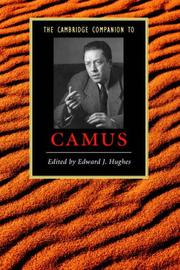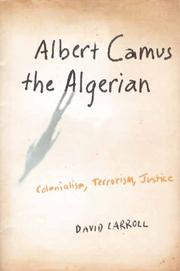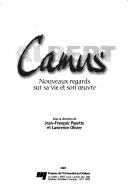| Listing 1 - 3 of 3 |
Sort by
|

ISBN: 9780521549783 9780521840484 0521549787 0521840481 1139001396 1139817302 9781139001397 Year: 2007 Publisher: Cambridge : Cambridge University Press,
Abstract | Keywords | Export | Availability | Bookmark
 Loading...
Loading...Choose an application
- Reference Manager
- EndNote
- RefWorks (Direct export to RefWorks)
Albert Camus is one of the iconic figures of twentieth-century French literature, one of France's most widely read modern literary authors and one of the youngest winners of the Nobel Prize for Literature. As the author of L'Etranger and the architect of the notion of 'the Absurd' in the 1940s, he shot to prominence in France and beyond. His work nevertheless attracted hostility as well as acclaim and he was increasingly drawn into bitter political controversies, especially the issue of France's place and role in the country of his birth, Algeria. Most recently, postcolonial studies have identified in his writings a set of preoccupations ripe for revisitation. Situating Camus in his cultural and historical context, this 2007 Companion explores his best-selling novels, his ambiguous engagement with philosophy, his theatre, his increasingly high-profile work as a journalist and his reflection on ethical and political questions that continue to concern readers today.
Camus, Albert --- Camus, Albert, --- Kami︠u︡, Alʹber, --- Kʻa-mu, --- Kamu, --- Chia-mou, --- Jiamou, --- Chia-miu, --- Jiamiu, --- Kʻa-miu, --- Kamiu, --- Albīr Kāmī, --- Kāmī, Albīr, --- Kāmū, Albīr, --- Ḳami, Alber, --- Kamy, Albert, --- Kāmyu, Ālper, --- Kāmyu, Ālpark, --- Mathe, Albert, --- Bauchart, --- Saetone, --- קאמי, אלבר, --- كامو، البير، --- كامي، ألبير --- کامو، البرت، --- Criticism and interpretation. --- Philosophy. --- Romance Literatures --- French Literature --- Languages & Literatures --- کامو، آلبر --- Kamju, Al'ber

ISBN: 1281927805 9786613792785 0231511760 9780231511766 0231140878 9780231140874 023114086X 9780231140867 0231140878 9780231140874 9781281927804 6613792780 Year: 2007 Publisher: New York : Columbia University Press,
Abstract | Keywords | Export | Availability | Bookmark
 Loading...
Loading...Choose an application
- Reference Manager
- EndNote
- RefWorks (Direct export to RefWorks)
In these original readings of Albert Camus' novels, short stories, and political essays, David Carroll concentrates on Camus' conflicted relationship with his Algerian background and finds important critical insights into questions of justice, the effects of colonial oppression, and the deadly cycle of terrorism and counterterrorism that characterized the Algerian War and continues to surface in the devastation of postcolonial wars today. During France's "dirty war" in Algeria, Camus called for an end to the violence perpetrated against civilians by both France and the Algerian National Liberation Front (FLN) and supported the creation of a postcolonial, multicultural, and democratic Algeria. His position was rejected by most of his contemporaries on the Left and has, ironically, earned him the title of colonialist sympathizer as well as the scorn of important postcolonial critics. Carroll rescues Camus' work from such criticism by emphasizing the Algerian dimensions of his literary and philosophical texts and by highlighting in his novels and short stories his understanding of both the injustice of colonialism and the tragic nature of Algeria's struggle for independence. By refusing to accept that the sacrifice of innocent human lives can ever be justified, even in the pursuit of noble political goals, and by rejecting simple, ideological binaries (West vs. East, Christian vs. Muslim, "us" vs. "them," good vs. evil), Camus' work offers an alternative to the stark choices that characterized his troubled times and continue to define our own. "What they didn't like, was the Algerian, in him," Camus wrote of his fictional double in The First Man. Not only should "the Algerian" in Camus be "liked," Carroll argues, but the Algerian dimensions of his literary and political texts constitute a crucial part of their continuing interest. Carroll's reading also shows why Camus' critical perspective has much to contribute to contemporary debates stemming from the global "war on terror."
LITERARY CRITICISM / European / French. --- Camus, Albert, --- Camus, Albert --- Kamju, Al'ber --- Kami︠u︡, Alʹber, --- Kʻa-mu, --- Kamu, --- Chia-mou, --- Jiamou, --- Chia-miu, --- Jiamiu, --- Kʻa-miu, --- Kamiu, --- Albīr Kāmī, --- Kāmī, Albīr, --- Kāmū, Albīr, --- Ḳami, Alber, --- Kamy, Albert, --- Kāmyu, Ālper, --- Kāmyu, Ālpark, --- Mathe, Albert, --- Bauchart, --- Saetone, --- קאמי, אלבר, --- كامو، البير، --- كامي، ألبير --- کامو، البرت، --- کامو، آلبر --- Political and social views. --- Political and social views

ISBN: 1459334566 2760521885 2760515060 9782760521889 9781459334564 9782760515062 Year: 2007 Publisher: Québec, Québec : Presses de l'Université du Québec,
Abstract | Keywords | Export | Availability | Bookmark
 Loading...
Loading...Choose an application
- Reference Manager
- EndNote
- RefWorks (Direct export to RefWorks)
Camus, Albert, -- 1913-1960 -- Criticism and interpretation. --- Camus, Albert, -- 1913-1960 -- Critique et interprétation. --- Camus, Albert, -- 1913-1960 -- Pensée politique et sociale. --- Camus, Albert, -- 1913-1960 -- Political and social views. --- Electronic books. --- Livres électronique. --- Romance Literatures --- Languages & Literatures --- French Literature --- Camus, Albert, --- Political and social views. --- Criticism and interpretation. --- Critique et interprétation. --- Pensée politique et sociale. --- Kami︠u︡, Alʹber, --- Kʻa-mu, --- Kamu, --- Chia-mou, --- Jiamou, --- Chia-miu, --- Jiamiu, --- Kʻa-miu, --- Kamiu, --- Albīr Kāmī, --- Kāmī, Albīr, --- Kāmū, Albīr, --- Ḳami, Alber, --- Kamy, Albert, --- Kāmyu, Ālper, --- Kāmyu, Ālpark, --- Mathe, Albert, --- Bauchart, --- Saetone, --- קאמי, אלבר, --- كامو، البير، --- كامي، ألبير --- کامو، البرت، --- کامو، آلبر --- Camus, Albert --- Kamju, Al'ber
| Listing 1 - 3 of 3 |
Sort by
|

 Search
Search Feedback
Feedback About
About Help
Help News
News